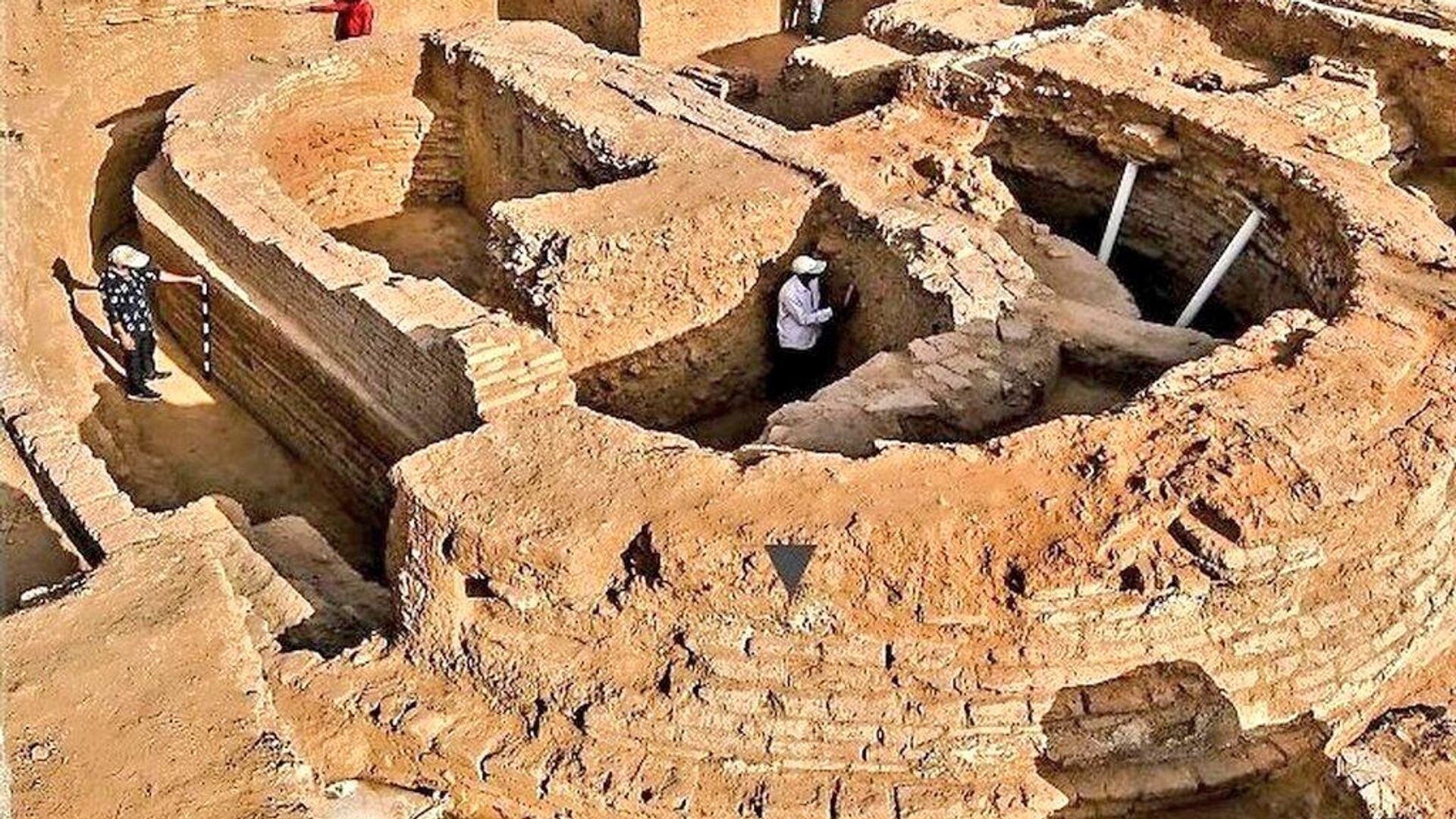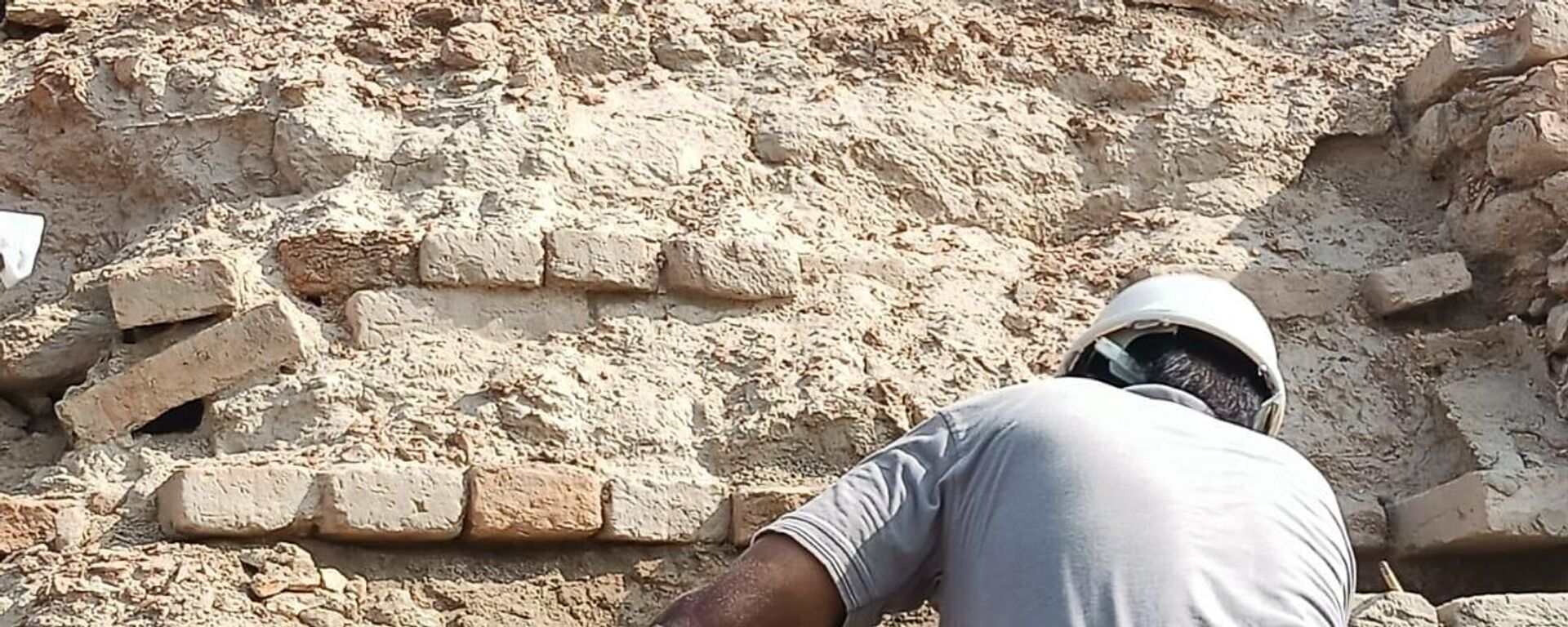https://sputniknews.in/20240117/archaeologists-unearth-2800-year-old-settlement-in-pm-modis-hometown-6232059.html
Archaeologists Unearth 2,800-Year-Old Settlement in PM Modi's Hometown
Archaeologists Unearth 2,800-Year-Old Settlement in PM Modi's Hometown
Sputnik India
The Vadnagar village in Gujarat is famous for not just being the hometown of PM Narendra Modi but also for its multi-cultural & multi-religious (Buddhist, Hindu, Jain, and Islamic) settlement.
2024-01-17T15:39+0530
2024-01-17T15:39+0530
2024-01-17T15:40+0530
india
gujarat
narendra modi
science & tech
history
climate change
archaeological sites
central asia
culture
cultural heritage
https://cdn1.img.sputniknews.in/img/07e8/01/11/6234244_0:38:1024:614_1920x0_80_0_0_9648c8b1bca168b579ab04f7c786202b.jpg
Prime Minister Narendra Modi’s native village Vadnagar in Gujarat has come into the spotlight after the discovery of the remains of 2,800-year-old human settlement that is as old as 800 BCE (before the Christian Era).After eight years of comprehensive study of the several deep trenches in the village, the archaeologists have found evidence of the presence of as many as seven cultural periods.These include Mauryan, Indo-Greek, Indo-Scythian or Shaka-Kshatrapas, Hindu-Solankis, Sultanate-Mughal (Islamic), and Gaekwad-British colonial rule.In the study published in Elsevier Journal 'Quaternary Science Reviews', the experts revealed that they had discovered one of the oldest Buddhist monasteries along with archaeological artifacts, potteries, copper, gold, silver, and iron objects, and intricately designed bangles.“We also found coin moulds of Greek king Appollodatus during the Indo-Greek rule at Vadnagar,” ASI archaeologist Abhijit Ambekar, the co-author of the paper, said.The experts said that the so-called ‘Dark Age’ after the Harappan civilisation’s collapse is a myth and the driving force behind these historical events appears to be significant changes in climate, such as fluctuations in rainfall or periods of drought.They also suggested a correlation between the rise and fall of various kingdoms over a 3,000-year period and recurrent invasions by Central Asian warriors.
https://sputniknews.in/20231221/ancient-city-under-almora-archaeologists-set-to-dig-up-gevad-valley-5906692.html
india
gujarat
central asia
Sputnik India
feedback.hindi@sputniknews.com
+74956456601
MIA „Rossiya Segodnya“
2024
Sangeeta Yadav
https://cdn1.img.sputniknews.in/img/07e6/0c/0f/110602_0:0:641:640_100x100_80_0_0_c298016a79eb02ef8caa9d1f688c12a5.jpg
Sangeeta Yadav
https://cdn1.img.sputniknews.in/img/07e6/0c/0f/110602_0:0:641:640_100x100_80_0_0_c298016a79eb02ef8caa9d1f688c12a5.jpg
News
en_IN
Sputnik India
feedback.hindi@sputniknews.com
+74956456601
MIA „Rossiya Segodnya“
Sputnik India
feedback.hindi@sputniknews.com
+74956456601
MIA „Rossiya Segodnya“
Sangeeta Yadav
https://cdn1.img.sputniknews.in/img/07e6/0c/0f/110602_0:0:641:640_100x100_80_0_0_c298016a79eb02ef8caa9d1f688c12a5.jpg
vadnagar village, gujarat, hometown of prime minister narendra modi, multi-cultural, multi-religious, buddhist, hindu, jain, islamic, 2,800-year-old human settlement, deep trenches, seven cultural periods, mauryan, indo-greek, indo-scythian, shaka-kshatrapas, hindu-solankis, sultanate-mughal (islamic), gaekwad-british colonial rule, iit kharagpur, archaeological survey of india (asi), physical research laboratory (prl), jawaharlal nehru university (jnu), deccan college, unearthed, oldest living city within a single fortification, elsevier journal, quaternary science reviews, oldest buddhist monasteries, archaeological artefacts, potteries, copper, gold, silver, iron objects, bangles, coin moulds of greek king appollodatus, indo-greek rule at vadnagar, asi archaeologist abhijit ambekar, dark age, harappan civilisation’s collapse, climate, fluctuations in rainfall, drought, kingdoms, invasions, central asian warriors
vadnagar village, gujarat, hometown of prime minister narendra modi, multi-cultural, multi-religious, buddhist, hindu, jain, islamic, 2,800-year-old human settlement, deep trenches, seven cultural periods, mauryan, indo-greek, indo-scythian, shaka-kshatrapas, hindu-solankis, sultanate-mughal (islamic), gaekwad-british colonial rule, iit kharagpur, archaeological survey of india (asi), physical research laboratory (prl), jawaharlal nehru university (jnu), deccan college, unearthed, oldest living city within a single fortification, elsevier journal, quaternary science reviews, oldest buddhist monasteries, archaeological artefacts, potteries, copper, gold, silver, iron objects, bangles, coin moulds of greek king appollodatus, indo-greek rule at vadnagar, asi archaeologist abhijit ambekar, dark age, harappan civilisation’s collapse, climate, fluctuations in rainfall, drought, kingdoms, invasions, central asian warriors
Archaeologists Unearth 2,800-Year-Old Settlement in PM Modi's Hometown
15:39 17.01.2024 (Updated: 15:40 17.01.2024) The Vadnagar village in Gujarat is famous for not just being the hometown of PM Narendra Modi but also for its multi-cultural & multi-religious (Buddhist, Hindu, Jain, and Islamic) settlement.
Prime Minister Narendra Modi’s native village Vadnagar in Gujarat has come into the spotlight after the discovery of the remains of 2,800-year-old human settlement that is as old as 800 BCE (before the Christian Era).
After
eight years of comprehensive study of the several deep trenches in the village, the
archaeologists have
found evidence of the presence of as many as
seven cultural periods.
These include Mauryan, Indo-Greek, Indo-Scythian or Shaka-Kshatrapas, Hindu-Solankis, Sultanate-Mughal (Islamic), and Gaekwad-British colonial rule.
A team of experts from IIT Kharagpur, the Archaeological Survey of India (ASI), the Physical Research Laboratory (PRL), Jawaharlal Nehru University (JNU), and Deccan College have claimed that they have unearthed the oldest living city within a single fortification so far in India.
In the study published in Elsevier Journal 'Quaternary Science Reviews', the experts revealed that they had discovered one of the oldest
Buddhist monasteries along with archaeological artifacts, potteries, copper, gold, silver, and iron objects, and intricately designed bangles.
“We also found coin moulds of Greek king Appollodatus during the Indo-Greek rule at Vadnagar,” ASI archaeologist Abhijit Ambekar, the co-author of the paper, said.
The experts said that the so-called ‘
Dark Age’ after the
Harappan civilisation’s collapse is a myth and the driving force behind these historical events appears to be significant changes in climate, such as fluctuations in rainfall or periods of drought.
They also suggested a correlation between the rise and fall of various kingdoms over a 3,000-year period and recurrent invasions by Central Asian warriors.



